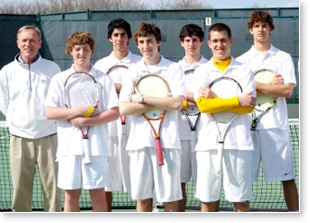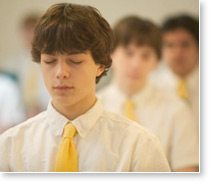Eleven-year-old Lawrence Eyre loved tennis from the first moment he set foot on court. He learned to play in the public parks of Moline, Illinois, and in high school he became the Quad-Cities singles and doubles champion. At Yale University he varsity lettered his freshman year, and then put competitive tennis on the back burner to pursue singing. His decision was rewarded when he was selected for the Whiffenpoofs, the world-famous a cappella group that just celebrated its 100th anniversary.
Mr. Eyre taught tennis throughout his B.A. and M.A. programs at Yale University—and then never stopped. Now 63, he has taught tennis to 15,000 young people at camps, schools, YMCAs, and summer park programs throughout the country. Lawrence is a founding faculty member of Maharishi School in Fairfield, Iowa, and in addition to teaching World History, American Government, and Science of Creative Intelligence, he has taught and coached tennis since 1988.
In 2009, the United States Professional Tennis Association (USPTA), the oldest credentialing body for teaching professionals and coaches in the world, named Mr. Eyre “National High School Coach of the Year.”
Lawrence speaks enthusiastically about how the Transcendental Meditation program helped him earn national recognition as one of the nation’s top high school tennis coaches.
 What do you like about teaching tennis?
What do you like about teaching tennis?
I love sharing tennis with young people. I enjoy helping them extend themselves to develop new skills and remain enthusiastic in the process. Many students get scared or frustrated when learning new skills. They literally put their bodies on the line when taking tennis lessons, and if they feel failure, it’s immediate and concrete. It’s exhilarating to be able to help them get through the challenges and enrich their enjoyment of the game.
How does practicing the Transcendental Meditation technique help you as a tennis teacher?
It’s easy for a tennis teacher to get caught up in correcting symptoms instead of causes, such as not being able to serve or hit overheads smoothly. After I learned TM, my perception was clearer and I could see to the root of my students’ problems. I was more patient and able to find solutions, because everyone learns differently.
What motivated you to learn the TM technique?
Having worked incredibly hard at Yale, it was clear to me that success often came with the sacrifice of serenity. I saw it around me–Type A personality burnout and people bulling their way through life in college and in the professional world. I observed community and government leaders and saw the strain they were under in their professional and family lives. I wanted to stay balanced and still accomplish as much as possible. TM has definitely provided the means to stay peaceful amidst the hurly-burly of daily life.
 All the members of the Maharishi School tennis team practice TM. How does meditation help their game?
All the members of the Maharishi School tennis team practice TM. How does meditation help their game?
High school students are generally not famous for composure, but our meditating players are able to remain composed during competitive play. Because they have stable physiologies, our players are even-keeled and much less volatile than most teenage athletes. Stable emotions make a huge difference in quality of play. Coaches are always trying to get players to perform at their peak. Peak experience is the basis of peak performance. TM helps our athletes play in the ‘zone’ because it helps them live there.
Do the Maharishi School tennis players have pre-game jitters?
Sure. With our team, it’s fair to say that butterflies in the stomach never disappear entirely, but with TM they fly in formation.
Fly in formation? What does that mean?
The adrenaline energy that’s an inevitable part of competition isn’t debilitating when the nervous system has less stress. Adrenaline is there, but in measured amounts that are not overwhelming, so players can remain focused and not lose balance.
In what specific ways does TM benefit the physiology of your players?
They have faster reaction times and quicker feet. After playing long points, our guys recover more quickly from exertion. Compared with their peers, our players also lose far less energy fretting and fuming over lost points or games. TM practice helps them remain unfazed by unforced errors and move on to the next point without getting upset or distracted. Seventy-five percent of a tennis match is time between points, so whoever recovers better and can return to a steady state is going to do better.
 Has the Maharishi School team done well?
Has the Maharishi School team done well?
Our team has won 16 state championships in Iowa 1-A singles, doubles, and team tennis in our 24 seasons. We’ve reached the state team championship match 11 times, despite having the smallest school in the state with a tennis program. The national honor I received from the USPTA stems from the Maharishi School tennis teams’ continuing success.
How has coaching at Maharishi School been a rewarding experience for you?
This is my 25th season coaching tennis here, and I am always proud when other Iowa coaches comment on our team’s cordial sportsmanship. It’s not a matter of my repeatedly reminding our players to be good sports. Our guys have a direct perception of their opponents, not as enemies, but as challengers who help them improve. They know that whatever happens on court happens for growth. It’s not just about their side of the court–they see the bigger picture. That’s for real; it’s not merely philosophical.
Do you have any closing remarks about your years of playing and teaching tennis?
I’m grateful for the game of tennis, because it has served as an avenue for growth and fulfillment for me and for all my students over the years. To be honest, the kids who practice Transcendental Meditation stand out among the thousands of young tennis players I’ve taught–they’re clear, receptive to learning, and able to utilize what I teach more readily than players who don’t have this resource.
 The kids at Maharishi School are not only fine tennis players, but because they are more rested and less stressed, they bring happiness and zest to all areas of their lives, whether it’s tennis or academics, artistic pursuits or relationships. It’s been a great pleasure to work with these integrated, healthy young people throughout the years.
The kids at Maharishi School are not only fine tennis players, but because they are more rested and less stressed, they bring happiness and zest to all areas of their lives, whether it’s tennis or academics, artistic pursuits or relationships. It’s been a great pleasure to work with these integrated, healthy young people throughout the years.
Lawrence Eyre is the author of High School Coaching Academy, a 2011 DVD series distributed by ChampionshipProductions.com.
—————————–
Christine Albers is Director of Expansion at Maharishi School in Fairfield, Iowa. She earned her Bachelor’s Degree in English and Master’s Degree in Higher Education Administration from Maharishi University of Management. She frequently writes about the transforming effect of the Transcendental Meditation program on the lives of students and teachers.



